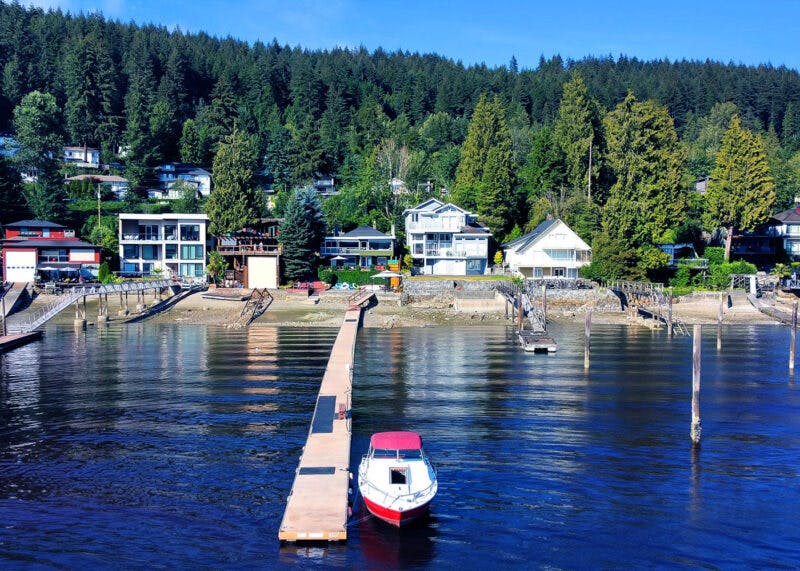
Vancouver is the largest city in the Canadian province of British Columbia. It is included in the ranking of the best cities in the world in quality of life. This metropolis is located in a unique beautiful place. On the one hand, it is surrounded by mountains, on the other, its shores are washed by the waters of the Pacific Ocean. No less unique is the climate of Vancouver. We will analyze its characteristic features in detail in this article. Where is Vancouver located? The city is located in western Canada, on the east coast of the Pacific Ocean. It is separated from the continental part by rocky mountains that cover it from the winds. Some peaks are covered with snow all year round. The remaining three sides of the city are surrounded by the ocean. But this does not mean that the climate of Vancouver is harsh, and strong winds and storms are raging here. In fact, from the oceanic influence the city covers the island of the same name, whose area is 31,285 km2. – The Kuroshio Current, washing the coast of Japan, moves northward and passes into the North Pacific. Its warm waters are attributed to the west coast of Canada. All these factors have a positive effect on climatic conditions. Vancouver, as well as the nearby city of Victoria, are considered the warmest throughout Canada. The transition from season to season is little perceptible. The only thing that changes is the frequency of rainy days.
Climatic conditions
This place can rightly be called the warmest in Canada. The climate in Vancouver is moderate. Winters are quite warm, and summers are cool. On the coast of British Columbia, precipitation is quite often and plentiful, due to its proximity to the ocean. However, the location of Vancouver is so unique (it is protected from the winds on all sides) that it rains less frequently than in other parts of the province, and snow is a rare occurrence.
Spring period
Vancouver is already relatively warm at this time. The average temperature is between 12-15 degrees. Most locals prefer cycling. Since spring, crowds of cyclists can be seen on the streets. The nature of Vancouver is unique. Already in early spring, a large number of greens is surprising. At this time, you should definitely visit city parks and gardens. At this time, sakura trees begin to bloom, representing an incredible sight.
Winters here are usually rainy, and with the advent of spring, sunny days become more and more. Since the snow lies on many peaks almost all year round, a ski vacation is available.
Vancouver in the summer
The summer period is quite warm, but not hot. The average temperature is 22 degrees, however, on certain days, it can rise to 30. The sea breeze cools the air a little. Due to this, the temperature decreases by several degrees. In summer, the weather is favorable for cycling, hiking, mountain biking and golf. You can also go for a walk in the mountains or on the coast just to get some fresh air. Despite the warm weather, the water in the ocean is pretty cool. It warms up only 20-22 degrees Celsius. Therefore, local residents prefer to swim in the lakes.
What to expect from the fall?
Practically all autumn the weather is moderate. The average temperature is 6-12 degrees above zero. It is getting colder closer to mid-October. At this time, the rainy season begins in Vancouver, which lasts until March inclusive. It is not necessary at this time to leave the house without an umbrella. November is considered the rainiest. At the same time, snow begins to fall in the mountains.
Warm winter
The climate in Vancouver is temperate, and this is evident in the winter months. At this time, the average temperature indicators are equal to 3-7 degrees of heat. Snow is a rare occurrence, even if it falls, it melts quickly. The days when the temperature drops below zero are negligible. Often rainfall occurs. Winter is a sad time in Vancouver, however, do not despair – if you like mountains and snow, go to the ski resort, which is located thirty minutes from the city.
Weather in Vancouver
The climate in this region is quite mild, due to the geographical location of the city. We invite you to find out interesting facts about the weather in Vancouver: The hottest weather was recorded on 07/30/2009. The thermometer bars rose to +34.4 ° C. Precipitation in the form of snow falls on average 10-11 times a year. Temperatures below -10 ° C lasts no more than two days. In winter, in the daytime, the thermometer columns practically do not fall below zero. On average, minus day temperatures are only 4-5 days a year. Snow rarely falls, but even if this happens, it melts quickly. There is little snowplow in Vancouver, so this kind of rain can lead to transport collapse. If the snow fell and did not melt quickly – this is a good reason not to come to work. In general, the climate of Vancouver is very favorable for human life. It is not hot in summer and relatively warm in winter. This is a wonderful corner of nature. In addition, Vancouver is considered Canada’s greenest city.

